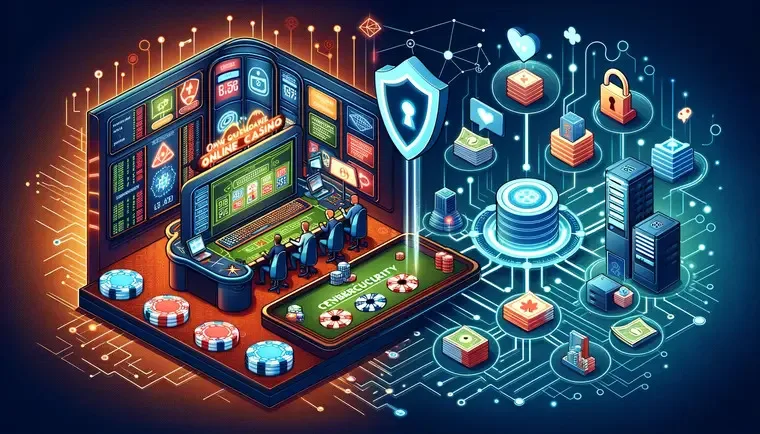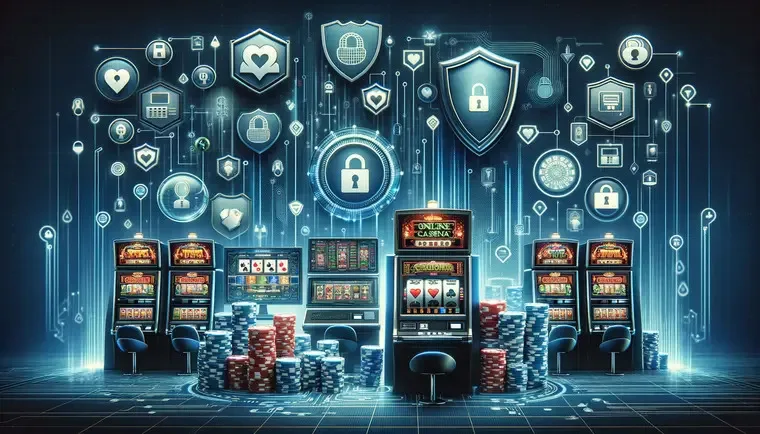Cybersecurity in Online Casinos: How Players’ Data and Money Are Protected

In the digital age, online casinos have become a popular form of entertainment, attracting millions of players worldwide. However, with this surge in popularity comes the critical need for robust cybersecurity measures. Protecting players’ data and money from cyber threats is paramount. This article explores the importance of cybersecurity in online casinos, identifies key threats, outlines the security measures implemented, and provides best practices for players to safeguard their information.
The Importance of Cybersecurity in Online Casinos
Rising Popularity of Online Gambling
The online gambling industry has seen exponential growth over the past decade. According to recent statistics, the global online gambling market is expected to reach over $127 billion by 2027. This growth is driven by technological advancements, increased internet penetration, and the convenience of accessing casino games from anywhere. However, the rise in online gambling also brings heightened risks, making cybersecurity a crucial aspect of the industry.
The Financial and Personal Stakes
The stakes in online gambling are high, both financially and personally. Players trust online casinos with sensitive information, including credit card details and personal identification data. A breach can lead to significant financial losses and identity theft. For online casinos, a security lapse can result in legal penalties, loss of reputation, and a decline in player trust. Therefore, ensuring robust cybersecurity is essential to protect both players and the business itself.
For example, Bingbong Casino, a popular platform known for its extensive game selection and user-friendly interface, places a high priority on cybersecurity. Bingbong has implemented state-of-the-art encryption technologies and secure payment processing systems to ensure that players’ data and money are protected. The casino’s commitment to cybersecurity not only safeguards its users but also enhances its reputation as a trustworthy and reliable online gambling destination.
Key Cybersecurity Threats in Online Casinos
Hacking and Data Breaches
Hacking and data breaches are among the most common threats faced by online casinos. Cybercriminals use sophisticated techniques to infiltrate casino systems and access sensitive data. Notable cases include the 2015 data breach at online poker site PokerStars, which exposed the personal information of millions of players. These incidents underscore the need for stringent security measures to prevent unauthorized access.
Phishing and Social Engineering
Phishing and social engineering attacks involve deceiving players into revealing their personal information. Cybercriminals often send fake emails or messages that appear to be from legitimate online casinos, tricking players into providing their login details or financial information. These attacks are highly effective and can lead to severe financial losses for unsuspecting players.
Malware and Ransomware
Malware and ransomware are malicious software programs designed to disrupt, damage, or gain unauthorized access to computer systems. Online casinos are prime targets for such attacks due to the large amounts of money handled. Ransomware attacks, in particular, can cripple casino operations by encrypting data and demanding a ransom for its release, as seen in the 2019 attack on the American casino operator, MGM Resorts.

Cybersecurity Measures Implemented by Online Casinos
Encryption Technologies
Encryption is a fundamental security measure used by online casinos to protect data. By converting information into a coded format, encryption ensures that only authorized parties can access it. Online casinos employ various encryption methods, such as Secure Sockets Layer (SSL) and Transport Layer Security (TLS), to protect data in transit and at rest, safeguarding player information from interception and unauthorized access.
Secure Payment Processing
Securing financial transactions is crucial for maintaining player trust. Online casinos use secure payment processing methods, including advanced encryption and tokenization, to protect financial data. Many casinos also partner with reputable third-party payment processors to ensure that transactions are secure and comply with industry standards.
Two-Factor Authentication (2FA)
Two-Factor Authentication (2FA) adds an extra layer of security by requiring players to provide two forms of identification before accessing their accounts. This could include something they know (password) and something they have (a mobile device). Implementing 2FA helps prevent unauthorized access, even if login credentials are compromised.
Advanced Security Protocols
Blockchain Technology
Blockchain technology is revolutionizing the security landscape in online casinos. By creating a decentralized and immutable ledger, blockchain enhances transparency and security. Smart contracts, powered by blockchain, automate transactions and ensure they are tamper-proof, providing an additional layer of security for online casino operations.
Artificial Intelligence and Machine Learning
Artificial Intelligence (AI) and Machine Learning (ML) are increasingly used to detect and prevent fraudulent activities in online casinos. AI algorithms analyze player behavior and identify patterns indicative of fraud, while ML continuously improves detection capabilities. These technologies help casinos stay ahead of cybercriminals and protect their players.
Regulatory and Compliance Measures
Industry Standards and Certifications
Online casinos must adhere to industry standards and obtain certifications to ensure their security measures are robust. Standards like the Payment Card Industry Data Security Standard (PCI DSS) provide guidelines for protecting financial data. Certifications from independent auditors validate that casinos comply with these standards, enhancing player trust.
Legal Requirements and Regulations
Regulatory bodies worldwide impose strict legal requirements on online casinos to protect players. Regulations such as the General Data Protection Regulation (GDPR) in Europe mandate stringent data protection practices. Non-compliance can result in severe penalties, making it imperative for casinos to adhere to these regulations.
Best Practices for Players
Choosing a Secure Online Casino
Players should carefully choose which online casinos to trust with their information. Key criteria include the casino’s licensing, security certifications, and reputation among users. Reading reviews and checking for any history of security breaches can help players make informed decisions.
Protecting Personal Information
Players must take proactive steps to safeguard their personal information. This includes using strong, unique passwords, enabling 2FA, and being cautious of phishing attempts. Players should avoid sharing sensitive information over email or unsecured channels.
Regular Monitoring and Reporting
Regularly monitoring account activity is crucial for early detection of unauthorized access. Players should review their transaction history and report any suspicious activity to the casino immediately. Prompt reporting can prevent further damage and help casinos take swift action.
Cybersecurity in online casinos is a critical issue that affects both players and operators. As online gambling continues to grow, the need for robust security measures becomes increasingly important. By understanding the threats and implementing advanced security protocols, online casinos can protect players’ data and money, ensuring a safe and enjoyable gaming experience.
